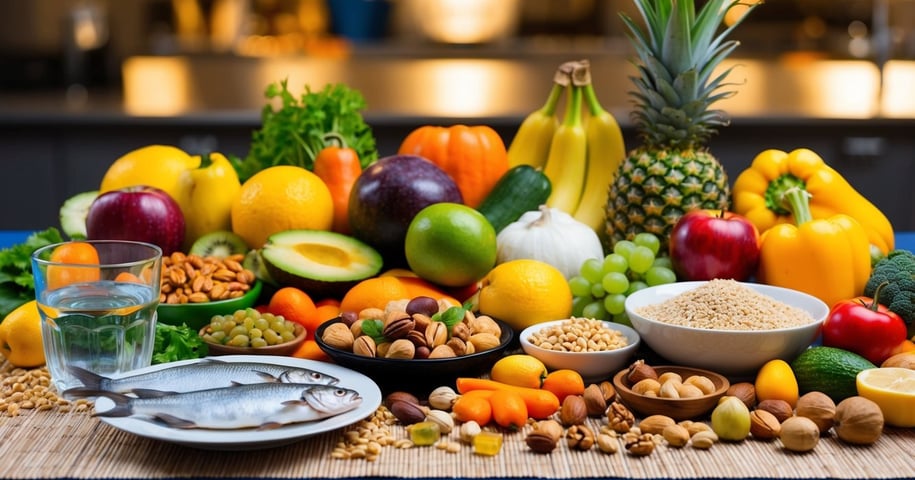The Role of Nutrition in Managing Depression: Foods That Help Boost Mood and Mental Wellbeing
Discover how nutrition impacts depression and explore foods that can enhance your mood and mental wellbeing. Boost your mental health through diet!
MENTAL HEALTH
3/8/20258 min read


The Role of Nutrition in Managing Depression: Foods That Help Boost Mood and Mental Wellbeing
Depression affects millions of people worldwide, impacting daily life and overall wellbeing. While medication and therapy are common treatments, emerging research suggests that nutrition plays a significant role in managing depression symptoms. What you eat can directly affect your brain chemistry and influence your mood, making dietary choices an important part of a holistic approach to mental health.
The connection between our gut and brain is stronger than previously thought. Certain foods contain nutrients that help produce mood-regulating neurotransmitters like serotonin and dopamine. Adding these foods to your diet isn't a cure, but it can be a powerful tool alongside other treatments.
Key Takeaways
Specific nutrients like omega-3 fatty acids, B vitamins and magnesium directly support brain function and can help reduce depression symptoms.
A Mediterranean-style diet rich in whole foods provides the best nutritional foundation for mental wellbeing.
Combining dietary improvements with regular exercise, quality sleep and professional support creates the most effective approach to managing depression.
Understanding Depression and Diet Connections
What we eat affects not just our physical health but also our mental wellbeing. The connection between food and mood is complex, involving brain chemicals, gut health, and nutrients that support proper brain function.
Effects of Diet on Brain Function
Your brain requires specific nutrients to function properly. Foods rich in omega-3 fatty acids, like fatty fish or flaxseeds, help build brain cell membranes and reduce inflammation. I've found that adding salmon to my diet twice weekly has improved my focus considerably.
B vitamins play a crucial role in brain health too. They help produce energy from food and create brain chemicals that regulate mood. Whole grains, eggs, and leafy greens are excellent sources.
Antioxidants from colourful fruits and vegetables protect your brain cells from damage. Blueberries, often called "brain berries," are packed with compounds that improve communication between brain cells.
Brain-Boosting Foods:
Fatty fish (salmon, mackerel)
Leafy greens
Berries
Nuts and seeds
Whole grains
Nutrition's Impact on Mood and Cognitive Function
Your food choices directly affect the production of neurotransmitters like serotonin and dopamine, which regulate your mood. About 95% of serotonin is produced in your gut, not your brain!
Foods rich in tryptophan, like turkey, eggs, and cheese, help your body produce serotonin. Combining these with complex carbohydrates can enhance this effect, which explains why a balanced meal often improves your mood.
Sugar and highly processed foods can cause blood sugar spikes and crashes, leading to mood swings and irritability. I've noticed that when I cut back on biscuits and sweets, my mood becomes much more stable.
Vitamin D deficiency has been linked to depression symptoms. The BetterYou Vitamin D Oral Spray provides an easy way to supplement, especially during UK winters when sunshine is limited.
Depression and the Gut-Brain Axis
Your gut and brain constantly communicate through what scientists call the gut-brain axis. This connection helps explain why digestive issues often accompany anxiety and depression.
The trillions of microbes in your gut influence your mental health by producing compounds that affect brain function. Fermented foods like yoghurt, kefir, and sauerkraut support a healthy gut microbiome.
Prebiotic foods feed your beneficial gut bacteria. Garlic, onions, leeks, and asparagus are excellent choices. I started adding more garlic to my cooking and noticed improvements in both my digestion and energy levels.
Fibre-rich foods support gut health by feeding beneficial bacteria. A diverse diet with plenty of plant foods provides the variety your microbiome needs to thrive.
Reducing inflammatory foods like processed meats and fried items can also improve gut health and, consequently, your mood.
Key Nutrients for Managing Depression
Certain nutrients play a vital role in brain health and mood regulation. Research shows that what you eat can influence your mental wellbeing, with several key nutrients showing promise for depression management.
Omega-3 Fatty Acids and their Role in Brain Health
Omega-3 fatty acids are essential fats that your body cannot produce on its own. These powerful nutrients help build brain cell membranes and reduce inflammation, which may contribute to depression symptoms.
The two most beneficial types are EPA and DHA, found primarily in fatty fish like salmon, mackerel and sardines. Studies suggest that people with depression often have lower levels of omega-3s in their blood.
You can boost your intake through diet or supplements. A high-quality fish oil supplement like Vitabiotics Ultra Omega-3 can help if you don't eat fish regularly. For vegetarians, flaxseeds and walnuts provide ALA, a plant-based omega-3, though it's not as potent as the forms found in fish.
The Importance of B Vitamins and Folate
B vitamins are crucial for brain function and producing neurotransmitters that regulate mood. Vitamin B6, B12 and folate are particularly important for mental health.
Vitamin B6 helps create serotonin and dopamine—chemicals that influence mood. You can find it in poultry, bananas and potatoes. Vitamin B12, found in animal products like eggs and dairy, supports nerve function and brain health.
Folate (vitamin B9) deficiency has been linked to depression. Green leafy vegetables, legumes and fortified cereals are excellent sources. I've noticed a real difference in my energy levels since adding more spinach to my morning smoothies!
Some people have a genetic variation that makes it harder to process folate. In these cases, a methylfolate supplement like Solgar Folate might be more effective than standard folic acid.
Minerals and Antioxidants: Magnesium, Zinc, and Vitamin C
Minerals and antioxidants play key roles in brain function and stress response. Magnesium helps regulate neurotransmitters and has been called "nature's relaxant" for its calming effects.
Many people don't get enough magnesium from diet alone. Good sources include dark chocolate, avocados, nuts and seeds. Magnesium deficiency has been linked to higher rates of depression and anxiety.
Zinc is essential for brain and immune function. Oysters contain more zinc than any other food, but you can also find it in meat, legumes and seeds.
Vitamin C isn't just for immune support—it helps produce neurotransmitters and acts as a powerful antioxidant protecting brain cells. Citrus fruits, strawberries, bell peppers and broccoli are excellent sources.
A simple way to boost these nutrients is to add a handful of pumpkin seeds to your morning porridge or try a good-quality supplement like Viridian Magnesium Complex.
Foods That Support Mental Well-being
Certain foods can significantly impact your brain chemistry and help manage depression symptoms. The right nutritional choices can reduce inflammation, support neurotransmitter production, and improve overall mental health.
Incorporating Omega-3 Rich Foods: Fish and Nuts
Omega-3 fatty acids are essential for brain function and may help reduce depression symptoms. Fatty fish like salmon, mackerel, and sardines are excellent sources of these healthy fats. Try to include fish in your meals at least twice weekly for optimal benefits.
Walnuts, flaxseeds and chia seeds also provide plant-based omega-3s. A handful of walnuts (about 30g) daily can be an excellent snack that supports brain health. I've found that sprinkling ground flaxseeds on morning porridge is an easy way to boost omega-3 intake.
These foods help reduce inflammation in the brain, which is often linked to depression. Consider trying a quality omega-3 supplement like Bare Biology Lion Heart Omega-3 Fish Oil if you struggle to eat enough omega-rich foods.
Vegetables, Whole Grains, and Fermented Foods
Colourful vegetables, especially leafy greens like spinach and kale, contain folate that supports serotonin production. Berries are packed with antioxidants that protect the brain from oxidative stress.
Whole grains such as brown rice, quinoa and wholemeal bread provide steady energy and B vitamins that support mood regulation. They're much better choices than refined carbohydrates which can cause blood sugar spikes and crashes.
Fermented foods like yoghurt, kefir and sauerkraut contain probiotics that support gut health. The gut-brain connection is crucial for mental well-being, with research showing that a healthy gut microbiome may reduce anxiety and depression symptoms. Try adding a tablespoon of plain Greek yoghurt to your breakfast or enjoying kombucha as an alternative to fizzy drinks.
Identifying and Avoiding Mood Sabotaging Foods
Processed foods high in sugar and trans fats can trigger inflammation and worsen depression symptoms. Fast food, packaged snacks and sugary drinks may provide temporary pleasure but often lead to energy crashes and mood swings.
Excessive caffeine can disrupt sleep and increase anxiety, particularly if consumed later in the day. Try limiting coffee to one or two cups before noon, or switch to herbal teas like chamomile which can have calming effects.
Alcohol might seem to improve mood initially, but it's actually a depressant that can worsen symptoms over time. Consider replacing evening alcoholic drinks with herbal teas or sparkling water with fresh fruit. I've found that keeping trigger foods out of the house makes it much easier to make healthier choices that support my mental wellbeing.
Lifestyle Considerations and Additional Support
While food choices can significantly help with depression, they work best as part of a comprehensive approach. Proper nutrition should complement other lifestyle factors and treatments for maximum benefit.
Combining Nutrition with Other Treatments for Depression
Good nutrition works well alongside professional depression treatments. Many therapists and doctors now recognise the connection between diet and mental health. If you're taking medication for depression, certain foods can help it work better. For example, foods rich in omega-3s may enhance the effectiveness of antidepressants.
Always inform your healthcare provider about dietary changes. This is especially important if you have conditions like diabetes that affect how your body processes nutrients.
Professional support remains essential. A nutritionist can create a personalised eating plan that works with your medication and therapy. The Nutrition Complete Food Journal (on Amazon) helps track how different foods affect your mood.
Physical Activity and its Effects on Mood
Regular exercise powerfully complements nutritional approaches to managing depression. Just 30 minutes of moderate activity most days can significantly reduce depressive symptoms.
Exercise releases endorphins that naturally boost your mood. It also reduces inflammation and stress hormones that contribute to depression.
You don't need intense workouts to benefit. Walking, swimming, or gentle yoga can be effective. The key is consistency rather than intensity.
Exercise improves energy levels, sleep quality, and cognitive function—all important for mental well-being. It can also help regulate blood sugar levels, which affects mood stability.
Consider activities that combine movement with nature, as outdoor exposure provides additional benefits. The Fitness Mood Tracker (£9.99 on Amazon) helps connect your activity levels with changes in your mental state.
Hydration, Sleep, and Mindfulness Practices
Hydration directly impacts your brain function and mood. Even mild dehydration can worsen depressive symptoms and reduce energy. Aim for 6-8 glasses of water daily, with a reusable water bottle like the HydroMood Tracker ( on Amazon) to monitor intake.
Sleep quality profoundly affects depression. Poor sleep worsens symptoms while good sleep helps recovery. Create a consistent sleep schedule and avoid caffeine after 2pm. Many find that foods containing tryptophan (like turkey or bananas) help improve sleep when eaten a few hours before bedtime.
Mindfulness practices complement nutritional approaches by reducing stress and improving how you respond to emotions. Just 10 minutes of daily meditation can help manage depressive symptoms.
These practices support a healthy gut microbiome, which communicates directly with your brain through the gut-brain axis. When I struggled with low mood, combining better hydration with mindfulness made a noticeable difference within weeks.








